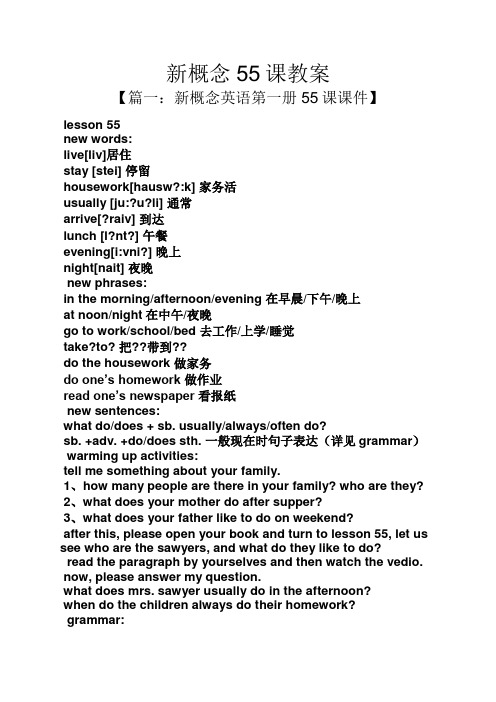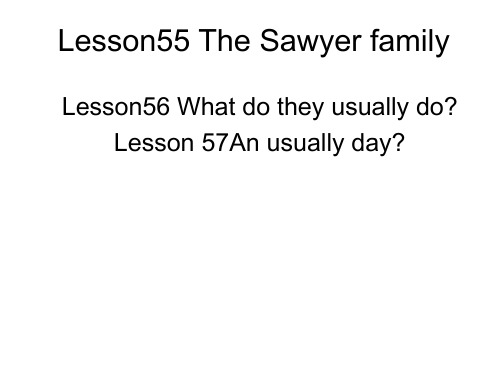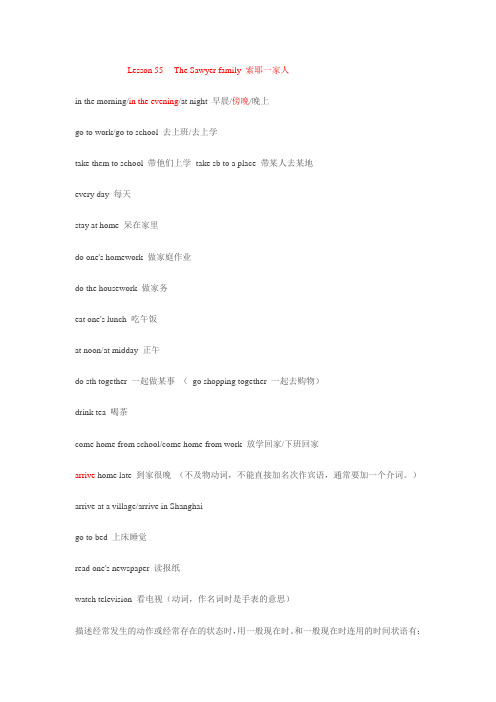新概念英语第一册第55课教学设计
新概念1第55课教案

新概念1第55课教案教案标题:新概念1第55课教案教学目标:1. 通过本课学习,学生能够掌握并正确运用本课所涉及的词汇和短语。
2. 学生能够理解并正确运用本课所涉及的语法结构。
3. 学生能够通过听说读写等多种方式,有效地表达自己的观点和意见。
教学重点:1. 本课所涉及的词汇和短语的掌握与运用。
2. 本课所涉及的语法结构的理解与运用。
教学准备:1. 教材:《新概念英语》第一册2. 多媒体设备:投影仪、音响设备等3. 教学辅助材料:练习题、教学PPT等教学过程:Step 1: 导入 (5分钟)1. 让学生回顾上一课的内容,并通过问题回答来激活他们的知识。
2. 引入本课的主题,并激发学生对主题的兴趣。
Step 2: 词汇与短语学习 (15分钟)1. 呈现本课所涉及的新词汇和短语,并帮助学生正确理解其意思。
2. 进行词汇和短语的发音练习,让学生跟读并模仿。
Step 3: 语法结构讲解与练习 (20分钟)1. 介绍本课的语法结构,并讲解其用法和注意事项。
2. 利用示例句子和练习题,帮助学生理解和运用该语法结构。
3. 进行语法练习,巩固学生对该语法结构的掌握。
Step 4: 听力训练 (15分钟)1. 播放与本课内容相关的听力材料,让学生通过听力理解并获取相关信息。
2. 提供听力练习题,让学生根据听到的内容回答问题。
Step 5: 口语练习 (15分钟)1. 设计口语练习活动,让学生运用本课所学的词汇、短语和语法结构进行对话练习。
2. 分组进行角色扮演活动,让学生在实际情景中运用所学知识进行对话。
Step 6: 书面表达 (10分钟)1. 提供书面表达题目,要求学生根据所学内容进行书面表达练习。
2. 鼓励学生用自己的语言表达观点和意见,并给予适当的指导和反馈。
Step 7: 总结与作业布置 (5分钟)1. 总结本课的重点内容,并对学生的学习情况进行评价。
2. 布置相关的作业,巩固学生对本课所学知识的掌握。
教学拓展:1. 鼓励学生利用课外时间进行更多的阅读和听力练习,提高英语综合运用能力。
新概念英语第一册第55课 (2)

live 2
usually
home 1 stay 3
housework lunch 4 live
night 2
stay
2 3 home
together 3
arrive
usually 1
arrive 2
1 housework
2 lunch
night 1
afternoon 1
home
together 2
stay v. 呆在,停留 home n. 家;adv. 在家,到家 housework n. 家务 lunch n. 午饭 afternoon n. 下午
adv. 一起 n. v. n. 晚上 到达 夜间
Mine sweeping(扫雷游戏,单词下埋着6颗雷,学生选择单词读出, 如果单词下没雷则可得分,如果所读单词下有雷,不能得分。)
cleans the blackboard
go to bed
washes the dishes
type some letters
drinks some watch television reads her milk eats her lunch newspaper
Bye---bye!
?教师把土豆扔给某个学生该学生迅速说出要说的单词然后再扔给下一个学生接到土豆的学生立刻再说出另一个
Lesson 55 The sawyer family
索耶一家人
New words and expressions : live v. 住,生活 usually together evening arrive night adv. 通常
live at 住在……(有确切地址的小地方)
KEY WORDS
新概念55课教案

新概念55课教案【篇一:新概念英语第一册55课课件】lesson 55new words:live[liv]居住stay [stei] 停留housework[hausw?:k] 家务活usually [ju:?u?li] 通常arrive[?raiv] 到达lunch [l?nt?] 午餐evening[i:vni?] 晚上night[nait] 夜晚new phrases:in the morning/afternoon/evening 在早晨/下午/晚上at noon/night在中午/夜晚go to work/school/bed 去工作/上学/睡觉take?to? 把??带到??do the housework 做家务do one’s homework 做作业read one’s newspaper 看报纸new sentences:what do/does + sb. usually/always/often do?sb. +adv. +do/does sth. 一般现在时句子表达(详见grammar) warming up activities:tell me something about your family.1、how many people are there in your family? who are they?2、what does your mother do after supper?3、what does your father like to do on weekend?after this, please open your book and turn to lesson 55, let us see who are the sawyers, and what do they like to do?read the paragraph by yourselves and then watch the vedio. now, please answer my question.what does mrs. sawyer usually do in the afternoon?when do the children always do their homework?grammar:一般现在时:表示经常的习惯性的动作或者是现在的状态,常与表示频度的时间状语连用,表示客观事实或普遍真理。
新概念英语一册55课教学pptLesson55 The Sawyer family

Guess the words 1. Describes weather that is not very cold or not as cold as usual . ---mild 2.Every time, all the time or forever . ---always 3. The direction which goes towards the part of the Earth below the equator , opposite to the north. ---south 4.one of the four periods of the year; spring, summer, autumn or winter --- season 5. The thing which is being discussed, considered or studied ---subject
Lesson55 The Sawyer family
Lesson56 What do they usually do? Lesson 57An usually day?
Can you read these words?
mild always north east wet west south season best night rise early set late interesting subject conversation Brazil Germany Italy Russia Sweden Australian Austrian Canadian India Nigerian Turkish Thailand
Home work
1.背诵默写57课 2. 抄写单词55,56,57.一遍 3.学案,书上练习 4.造句:1. by car2. stay at home 3. in the garden 4. at the moment 5. do one’s homework.6.It’s … o’clock.
新概念英语第一册55-5645169电子教案

I often have / eat lunch at 12:30. He usually _h_a_s_/_e_a_tslunch at school.
afternoon 下午 in the afternoon 在下午 evening 晚上 in the evening 在晚上 night 夜晚 at night 在夜晚
usually
通常
often always sometimes
经常 总是 有时
arrive 到达 arrive in 到达……( 大地方) arrive at 到达……(小地方)
My father will arrive __i_n_ London tomorrow. I often arrive ___/_home early in the evening.
In the evening, do the children arrive home early?
Yes, they do. How about Mr. Sawyer?
He arrives home late.
At night, what does Mr. Sawyer usually do? What does he sometimes do with his wife?
_____up at 6:30. A. get, get B. gets, gets C. get, gets D. gets, get 2. ( B)Jim’s brother ____ in a factory. He usually _____ to work by car. A. work, go B. works, goes C. works, go D. work, goes 3.( A) ____ you always ____ basketball on Sundays? A. Do, play B. Does, play C. Are, playing D. Are, play 4.( D) _____ your father often____ TV in the evening?
新概念第一册L55-56

e.g. Tom lives with a tiger. We live with flowers.
Practice
• Mrs. Sawyer lives ____London.
• Mrs. Li live ____ Wangcheng Road.
L55—56
The Sawyer Family
Teaching Plan
Teaching Aims: 1.1 L55课文单词学习 1.2 复习52国家名及重点句型 Key points: 2.1 L55课文单词学习 2.2 L55中重点动词词组的教授 2.3课文的串讲
Teaching Procedures: • Before classes:
Lead in
• How many people are there in your family? • Who are they?
The sawyer family
• home:指家庭成员在一起生活的地方, 家, 家乡本国) • house:主要指建筑物,住宅。 • family:强调家庭成员或子女。
How about the sawyer family?
who
Mr. Sawyer
morning noon afternoon evening night
children
Mrs. Sawyer
本次还课:听写、笔记、背L53
• Homework • L55 单词1:1:3抄写并划分音节、背会,家 长签字 • L55课文抄写一遍,家长签字
The sawyer family
• Home:指家庭成员生活的地方 (家,家乡,本国) • house:主要指建筑物,住宅。 • family:强调家庭成员或子女。
新概念英语第一册55课教案

Lesson 55 ---The Sawyer family 索耶一家人in the morning/in the evening/at night 早晨/傍晚/晚上go to work/go to school 去上班/去上学take them to school 带他们上学take sb to a place 带某人去某地every day 每天stay at home 呆在家里do one's homework 做家庭作业do the housework 做家务eat one's lunch 吃午饭at noon/at midday 正午do sth together 一起做某事(go shopping together 一起去购物)drink tea 喝茶come home from school/come home from work 放学回家/下班回家arrive home late 到家很晚(不及物动词,不能直接加名次作宾语,通常要加一个介词。
)arrive at a village/arrive in Shanghaigo to bed 上床睡觉read one's newspaper 读报纸watch television 看电视(动词,作名词时是手表的意思)描述经常发生的动作或经常存在的状态时,用一般现在时。
和一般现在时连用的时间状语有:every day/at night/in the morning/in the afternoon/in the evening 经常连用的副词:usually/often/sometimesWhat do/does --- usually do? 某人通常做什么?breakfast/lunch/supper 早饭/中饭/晚饭The Sawyer s live at 87 King Street.姓氏后加s,前加定冠词the,表示某某一家人(the Smiths/the Johnsons)。
新概念英语第一册55-56课详解

新概念英语第一册55-56课详解Lesson 55-56 of New Concept English Book 1 Detailed Explanation.Lesson 55: The Sawyer Family.Vocabulary and Expressions:live [lɪv] v.: This verb has multiple meanings. Firstly, it can mean to reside or habitually inhabit a place. For example, "I live in Hefei." Secondly, it can mean to exist or be alive, as in "People cannot live without air." Lastly, it can be used in the expression "live a/an... life" to describe the way someone lives their life.stay [steɪ] v.: This Verb primarily means to remain in a place for a period of time. It can also be used figuratively to mean "remain" in a certain state or condition, as in "stay hungry, stay foolish."home [həʊm] n./adv.: As a noun, it refers to the place where one lives. As an adverb, it means "to the place where one lives," as in "go home."housework ['haʊswɜːk] n.: This noun refers to the tasks related to maintaining a household, such as cleaning, cooking, and laundry.lunch [lʌnʃ] n.: This noun refers to the meal eaten in the middle of the day.afternoon [ɑːftə'nuːn] n.: This noun refers to the period of time between noon and evening.Text Explanation:Lesson 55 introduces the Sawyer family and their daily routine. The lesson begins by introducing the family members and their occupations. Mr. Sawyer works in an office, while Mrs. Sawyer stays at home. The children go to school. The lesson then goes on to describe their eveningactivities. Mr. Sawyer usually arrives home from work at about five o'clock, and the family then has their lunch together. In the afternoon, they often have a rest, andthen in the evening, they usually stay at home and watch television.Grammar Points:The use of "-s" or "-es" to form the third-person singular present tense of verbs is reinforced in this lesson. For example, "Mr. Sawyer usually arrives home from work at about five o'clock."The use of prepositions with "live" is also introduced. For example, "Mr. Sawyer lives in a town near London,"where "in" is used with a large place, and "Mrs. Sawyerlives at 87 King Street," where "at" is used with aspecific address.Lesson 56: What Do They Do?Vocabulary and Expressions:together [tə'geðə] adv.: This adverb means "in a group" or "side by side."evening ['iːvnɪŋ] n.: This noun refers to the time of day that comes after afternoon and before night.arrive [ə'raɪv] v.: This Verb means to reach a destination after a journey.night [naɪt] n.: This noun refers to the period of time from sunset to sunrise.Text Explanation:Lesson 56 continues the theme of the Sawyer family's daily life by asking the question, "What do they do?" The lesson provides information about the family's evening activities. Mr. Sawyer usually arrives home from work at about five o'clock, and then the family has their tea together. After tea, they usually sit in the living room and watch television. Sometimes, they go to the cinema orto the theater. On Sundays, they often go for a walk in the park.Grammar Points:The present tense of verbs is reinforced in this lesson, particularly the use of the third-person singular form.The lesson also introduces the use of modal verbs such as "can" and "usually" to express ability and frequency.Conclusion:Lessons 55 and 56 of New Concept English Book 1 focus on the Sawyer family's daily routine and activities. These lessons introduce new vocabulary and expressions related to family life, daily activities, and grammar points such as the use of "-s" or "-es" in the third-person singular present tense and the use of modal verbs. By learning these lessons, students can improve their understanding of family life in English-speaking countries and enhance theirlanguage skills in areas such as vocabulary, grammar, and comprehension.。
- 1、下载文档前请自行甄别文档内容的完整性,平台不提供额外的编辑、内容补充、找答案等附加服务。
- 2、"仅部分预览"的文档,不可在线预览部分如存在完整性等问题,可反馈申请退款(可完整预览的文档不适用该条件!)。
- 3、如文档侵犯您的权益,请联系客服反馈,我们会尽快为您处理(人工客服工作时间:9:00-18:30)。
新概念第55课教案设计
课型:New lesson
(2)教学内容与目的要求:
1、Learn Lesson 55
2、Learn Simple Present.
(3)重点句型及重点单词、词语:
(4)教学准备:
①Recorder ②tape ③phonogram cards ④word cards ⑤stars ⑥poster ⑦phonetic symbol cards ⑧teaching plan ⑨教学流程表⑩Pictures
(6)教学程序及教学游戏安排:
StepⅠ:Warming up exercise
1.Genral greeting
2.1.go to work, 上班。
3.由动词 go引导的短语课文中还有:go to school(上学), go to bed(上床睡觉)。
请注意work, school以及 bed之前不带任何冠词。
4. 2.stay at home, 呆在家里。
5.与 stay home在意思上相差无几。
前者中的 home是名词,后者中的home是副词。
6. 3.do the housework, 料理家务。
7.housework是不可数名词。
请比较:do the homework(做作业)。
8. 4.at night, 在夜里。
9.如果说某日夜里,则用介词 on: on the night of June 2 在6月2日的夜里
10.语法 Grammar in use
11.一般现在时(2)(请参见 Lessons 47~48语法部分。
)
12.一般现在时用于表示一个习惯动作、有规律的行为以及永恒的现象。
一般与时间频度副词和时间短语连用。
这些时间短语有:
13.every day/week/month/year 每日/周/月/年
14.in the morning/afternoon/evening 在上午/下午/晚上
15.at noon/night 在正午/夜里
16.第3人称单数的谓语动词需加以变化,这可分为几种情况:
17.(1)一般情况在动词后面直接加 -s,如:want----wants come----comes
arrive----arrives
18.(2)以-s, -x, -ch, -sh, -o 结尾的动词加 -es,如:fix----fixes wash----washes go----goes watch----watches do----does
19.(3)以辅音加 -y结尾的动词,把 -y改成 -i,再加 -es;而元音加 -y结尾的动词,只加 -s即可:
20.hurry----hurries carry----carries play----plays stay----stays
21.词汇学习 Word study
22. 1.arrive v.
23.(1)到达;到来:
24.We arrived home early. 我们很早就到家了。
25.The train is expected to arrive in London at 8. 20 p. m. 火车预计在晚上8点20分抵达伦敦。
26.(2)(时间等)来临;(婴儿)出生:
27.At last the day of graduation arrived. 毕业的那一天终于来临。
28.Elizabeth's baby arrived at midnight. 伊丽莎白的婴儿是在午夜时分降生的。
29. 2.live v.
30.(1)居住;生活:
31.Frank lives in Paris. 弗兰克居住在巴黎。
32.Where do you live? 你住在哪儿?
33.(2)活;生存:
34.Fish can't live long out of water. 鱼离开水活不了多久。
35.My grandmother lived until she was 94. 我祖母活到了94岁。
36.(3)过生活;享受生活乐趣:
37.At 40 he was just beginning to live. 他到40岁才刚刚开始过上富有意义的生活。
38.You haven't lived till you've been to Paris. 你没到过巴黎就算不上享受过生活。
39.(4)靠……生活(by/on):
40.He lives by playing the violin. 他靠拉小提琴为生。
41.He lives on the fortune left to him by his father. 他靠他父亲给他留下的财产生活。
42. 3.stay v.
43.(1)呆在,停留:
44.Mrs. White stays at home every day. 怀特太太每天都呆在家中。
45.(2)逗留;暂住:
46.We were staying at the same hotel. 我们住在同一家饭店。
47.(3)持续;保留:
48.The house has to stay exactly as it was. 这所房子必须完全保持原来的样子。
49.练习答案 Key to written exercises
50.Lesson 56
51. A
52. 1 The children go to school in the morning.
53. 2 Their father takes them to school.
54. 3 Mrs. Sawyer stays at home.
55. 4 She does the housework.
56. 5 She always eats her lunch at noon.
57. B
58. 1 What does she do in the morning? She always makes the bed in the morning. 59. 2 What does he do in the morning? He always shaves in the morning.
60. 3 What do they do in the evening? They sometimes listen to the stereo in the evening.
61. 4 What does he do every day? He always cleans the blackboard every day. 62. 5 What do they do at night? They always go to bed early at night.
63. 6 What does she do every day? She usually washes the dishes every day. 64.7 What do they do in the afternoon? They usually type some letters in the afternoon.
65.8 What does it do every day? It usually drinks some milk every day.
66.9 What do they do in the evening? They sometimes watch television in the evening. 67.10 What does she do at noon? She always eats her lunch at noon.
68.11 What does he do in the evening? He often reads his newspaper in the evening
69.
70.
StepⅣConclusion
1 Sound and read words together and tell the rules .
2 Tell parents important and difficult points.
3 Praise Ss who have the best attitude in the class.
4 Homework。
